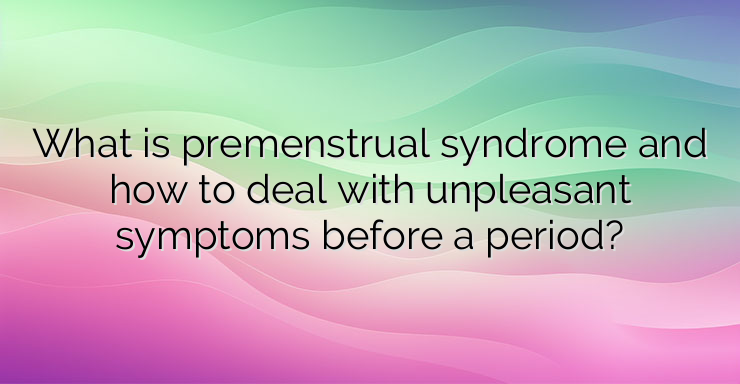Premenstrual syndrome is a common phenomenon, but not every woman necessarily experiences it. About 60-80% of women suffer from moderate to severe symptoms about a week before the start of their monthly cycle. However, this is not about the usual dull pains and tightness in the abdomen before a period, bloating and increased appetite, but about more serious premenstrual neurovegetative manifestations accompanied by vulnerability of the psyche, affecting emotions and behavior. If about a week (usually 4-5 days) before almost every menstrual cycle, you suffer from most of the following symptoms: Water retention, swelling of the ankles, fingers, face; Increased irritability, sudden mood swings, anxiety; Acne before and/or during cycle; Chest pain and tightness; Moderate to severe stomach and/or abdominal pain that does not go away without taking painkillers and/or antispasmodics; Headaches and/or migraines; Depression, crying for no reason; Constipation and/or diarrhea, nausea; Abdominal swelling; Change in sleep patterns, severe fatigue and drowsiness; Strong desire for something sweet, increased appetite; Sensitivity to light and sound; Tingling on the skin. It is most likely premenstrual syndrome (PMS). And yet, every woman is different. The good news is that these unpleasant symptoms disappear or sharply decrease immediately with the onset of the menstrual cycle or during the first 2-3 days (there are exceptions, of course). The explanation lies in changing hormone levels, of course. In a normally ovulating and menstruating woman, the preovulatory peak of estrogens becomes a plateau of relatively high estrogen levels. However, rising progesterone values in the middle of the second half of the menstrual cycle neutralize the biological effects of estrogens, and thus together with the secretory changes in the uterine mucosa, a “hormonal harmony” is reached in the body. During the time when progesterone production gradually goes from decreasing to absent, serotonin levels decrease, estrogen levels become relatively high, and thus the conditions for the occurrence of premenstrual syndrome appear. How can we help ourselves and in what case should we consult a doctor? Eat regularly and in small amounts. Adequate water intake is important. Be careful with the salt. Do not overdo it with coffee (one cup in the morning to wake up is quite enough during this period). Careful with the sugar! The desire to eat all the creations of the confectionery industry is understandable – the change in the levels of the hormones estrogen and progesterone during PMS also affects the hormone of happiness serotonin. That’s why it’s good to eat “antidepressant” foods rich in tryptophan, from which serotonin is formed in the body – milk, cheese, turkey, nuts, seeds, beans, bananas… Take time for enough sleep. Take more vitamins and combine them properly. Vitamins B, E and selenium will relieve irritability and sore breasts, while also boosting your energy.Taking magnesium is necessary for a better hormonal balance. Take probiotics, omega3 (DHA & EPA, fish oil), vitamin D3… According to data from various studies, ladies who consume calcium-rich foods are less likely to develop PMS. This is explained by the fact that the mineral alleviates the depressive states and anxiety characteristic of the delicate period. To prevent hunger pangs, quenched with unhealthy and high-calorie foods, do not skip meals and aim to eat culinary creations from different categories: lots of fruits and vegetables, meat and dairy products, whole grains and nuts. Cinema, good music, favorite movie, favorite hobby, walks, exercise will make you feel better. If the situation every month is really serious, consult an obstetrician-gynecologist. Possible causes that should be noted if present are: anemia, deficiency of certain valuable substances, endometriosis, thyroid gland problems, irritable bowel syndrome, rheumatological diseases, hormonal problems of any kind.


Leave a Reply